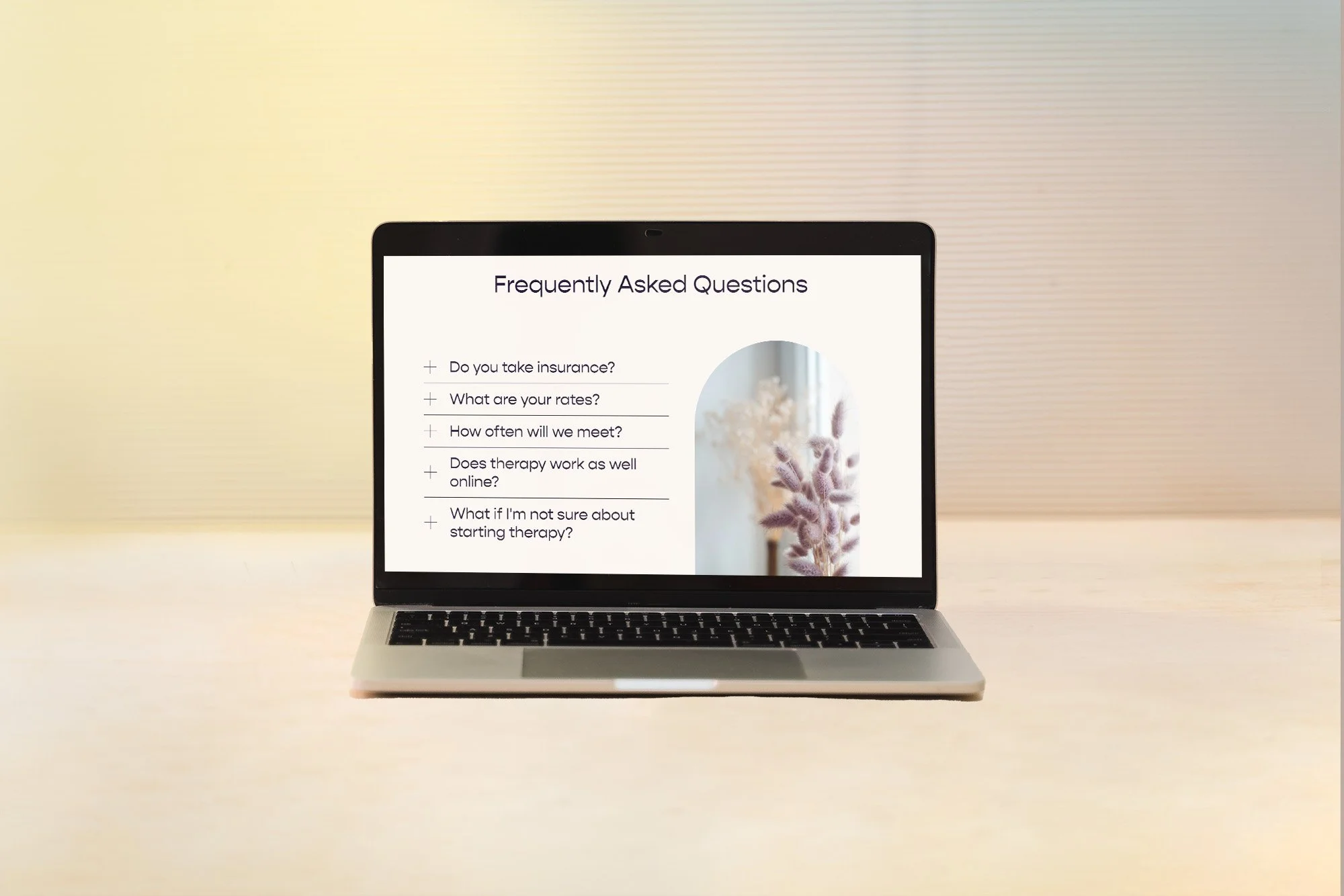Does SEO Still Matter in the Age of AI? What Therapists Need to Know in 2025
Maybe you’re noticing fewer clicks to your website lately. Maybe you’ve even heard whispers that SEO is “dead.”
You’re not alone. Search has definitely changed, and it’s changed fast.
But before you toss out your whole strategy, let’s stop and breathe. 🧘♀️
Today I’ll break down what’s changed, what hasn’t, and how therapists can still show up in search in 2025.
TL;DR:
Yes, SEO still matters, but the rules have changed. People are relying more and more on AI for search. Instead of chasing traffic or stuffing in keywords, you’ll need to focus on writing for humans while also structuring your content in a way AI can interpret so you can show up in more results.
SEO isn’t dead, but it has changed (and will continue to change).
Here’s what’s changed:
More folks start their searches by chatting with tools like Google’s Gemini or ChatGPT and get their answers there without clicking onto other sites.
AI Overviews show up at the top of most Google searches and provide really comprehensive answers in many cases.
So what does that mean? Fewer people are clicking through traditional search results. These are called “zero-click searches” (and based on some data these now make up the majority of searches).
That means someone can get an AI-generated answer without ever landing on your site.
So yes, your traffic is dropping. But actually, there’s some good news here!
Even though traffic is down, the visitors you do get are more engaged, informed, and ready to get started.
Why? Because people are doing deeper research through AI before clicking. That means when they do land on your site, they’re often more ready to take the next step (like scheduling a consultation).
You don’t have to focus on ranking on page one anymore.
Why? Because AI pulls information from all over the web-not just top ranking sites! As long as your content is trustworthy and well-constructed (more on this in a second), then AI doesn’t really care much about what position it is.
Don’t obsess over the number of visitors. Focus on engagement instead. Here’s what to look for:
Time visitors spend on a page. The longer time people spend indicates to Google/AI that your content is high-quality.
“Scroll depth.” Which is basically “how far down the page do your visitors go?” Do they follow it to the end or do they bounce at a certain point? The tool I use to get this info is called Crazy Egg (but there are plenty of others out there).
Interactions. Are people clicking buttons and internal links? Are they filling out your contact form?
“Bounce rate”. Are people clicking on your site and then leaving right away?
Clicks from Google or from AI. Many of my clients are seeing that their overall traffic is down, but the number of clicks to their site ha gone up!
How to Adapt Your SEO Strategy for the AI Era
1. Shift your focus away from keywords and rankings and instead focus on the quality of your content. Make sure it answers real questions in a thorough, thoughtful way.
Think in topic clusters. When you are writing a blog post or a specialty page, instead of just writing about “therapy for anxiety” try branching out.
“How do I know if my anxiety is serious?”
“What to expect in anxiety therapy”
“Can anxiety affect my physical health?”
(Not sure? You can actually ask ChatGPT to “fan out” and give you related topics or FAQ. You can also check out a cool tool called Answer the Public for ideas!)
2. Write stuff for humans, structure it for AI.
AI tools don’t scan your whole site—they rely on structure. Help them (and your readers!) with:
TLDR summaries at the top
Clear headlines and bullet lists
FAQs sections
Internal links to related content
Tables of contents for longer posts
And get to the point—don’t bury the answer. Show you understand the question, and offer a clear, direct response early on.
3. Demonstrate your expertise by offering a fresh intake or insight (rather than restating what is already out there).
AI tools favor creators who offer something new—not just regurgitated information. You can stand out by:
Sharing your unique perspective as a therapist
Citing your own experiences or client trends (while protecting confidentiality, of course)
Adding your take on emerging issues in mental health
Creating content that feels current, original, and helpful
You don’t need to be on the cutting edge of research to be seen as an authority. You just need to say something meaningful and real (that you can’t find already on Wikipedia 🤪).
4. Show that you’re a trusted source.
As a way to weed out AI generated, generic content, search engines are increasingly looking at trust indicators to decide whose content to recommend. These include:
Time on site and scroll behavior (as mentioned above)
Privacy policies, professional credentials, and about pages that clearly explain who you are
Review blocks and testimonials (your Google Business profile and other reviews online included, not just the ones on your website)
Clean, professional design (this matters more than many people think!)
5. Diversify where you show up.
Search tools like Google’s Gemini, ChatGPT, and Perplexity pull from different places. That means your blog isn’t your only option.
You can repurpose your content for:
Short YouTube videos (under 5 minutes works best)
LinkedIn posts that speak to your professional audience
Helpful Reddit comments (especially in mental health threads)
The more places you appear, the more chances you have to be recommended.
Bottom Line: SEO Still Matters—It’s Just Evolving
Search is changing. AI is everywhere. But the need for real human connection? That hasn’t gone anywhere.
Your website is still the place where someone reads your words and thinks, “Yes, I think I could talk to her.” That moment matters more than any algorithm.
And the good news?
You don’t have to chase trends. Just stay grounded and be thoughtful and specific.
SEO isn’t about tricks or hacks. It’s about helping people who need your services find you. That’s why:
Local SEO still works (aka, using your location in your keywords)
Niche-specific content still works (especially when it sticks to a specific topic and goes in-depth to answer the question)
Honest, helpful pages about your approach still work
You don’t need to write a blog post every week or learn a bunch of tech. You just need to show up clearly and consistently—on a site that reflects your voice.
Real humans still matter.
So keep sharing. Keep showing up.
The internet might be changing, but the power of your work?
That’s something no AI can replace.
FAQs
-
Yep. If you look at your website analytics and check out “referral sources” you will start to see “Chat GPT” show up as a source! Or if you do some Googling around you will start to see therapy practices showing up in AI Overviews!
People might ask ChatGPT or Google AI things like:
“What kind of therapy helps with anxiety?”
“How do I know if I need therapy?”
But when it comes to actually choosing a therapist, people still want to:
See your photos and know you’re a real human
Read about your personality and approach
Learn what you specialize in
Feel like they’ll be safe and understood
That’s not something AI can replicate. That’s where your website comes in.
-
If you’ve searched for something like “What are signs of anxiety?” and seen a summary box with an answer at the top of the page, that’s an AI Overview.
Google’s AI Overviews pull information from multiple websites to offer a fast, compiled answer. They’re now appearing for more sand search terms in 2025, including for general health or mental health questions.
So what does that mean for you?
Yes, people may get simple info without clicking.
But when they want a trusted therapist to work with, they still need to find a person.
That’s why your website is still key. You’re not just answering a question—you’re helping someone make a very personal decision about who to work with.
-
Short answer: Absolutely, yes.
Blogging is still one of the most effective ways to build trust, show your expertise, and answer the kinds of questions your ideal clients are Googling AND to show up in AI searches.
It’s all about how you package it. Prioritize clarity, structure, and skimmable formatting (think headings, bullet points, short blocks of text, white space, etc)
And remember, it doesn’t need to be a full-time job. One blog post a month is enough (and refreshing an old one counts!). Think about thoroughness, and answering real question and you’ll be on the right track.
Still feeling lost when it comes to SEO?
If SEO still feels confusing or overwhelming, you’re not alone. That’s exactly why I created the Bloom with SEO System—a simple, therapist-friendly course that helps you build your website’s SEO foundation in just a few minutes a day.
You’ll learn how to:
Pick the right keywords for your practice
Write content that speaks to your ideal clients
Show up in both Google and AI-powered results





